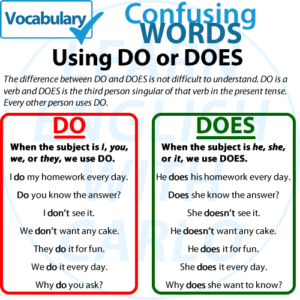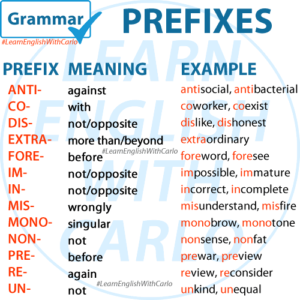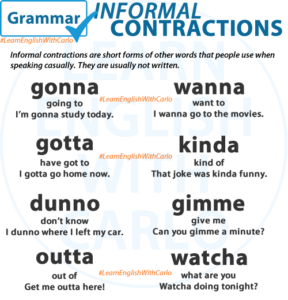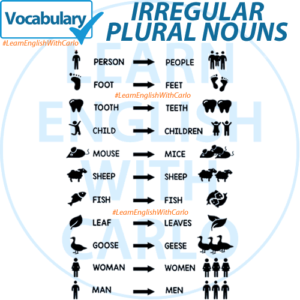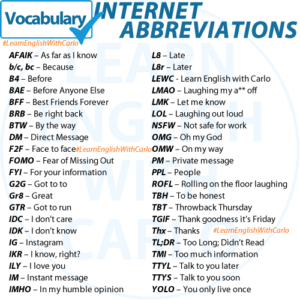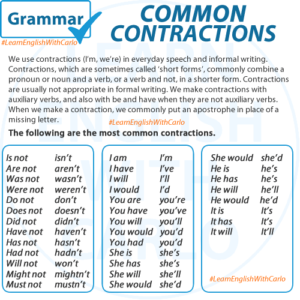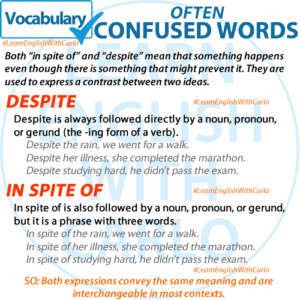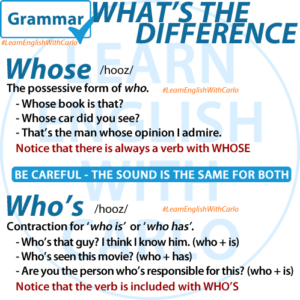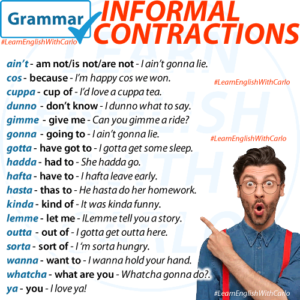The difference between DO and DOES is not difficult to understand.DO is a verb and DOES is the third person singular of that verb in the present tense. Every other person in the conjugation uses DO. When the subject is I, you, we, or they, we use DO. I do my homework every day.Do you …
Category: VOCABULARY
Permanent link to this article: https://englishyourway.com.br/confusing-words-do-vs-does/
Nov 18
Prefixes: Unlocking the Power of Word Beginnings
Have you ever wondered how a single word can convey vastly different meanings, just by adding a few letters at the beginning? Enter the fascinating world of prefixes – those tiny yet mighty linguistic tools that shape our language in profound ways. What are Prefixes? At their core, prefixes are linguistic building blocks, morphemes attached …
Permanent link to this article: https://englishyourway.com.br/prefixes-unlocking-the-power-of-word-beginnings/
Nov 13
VOCABULARY – Informal (spoken) Contractions
VOCABULARY – Informal (spoken) Contractions In English, as in most other languages, there are ways to shorten groups of words that commonly go together. We don’t do this in writing, just when we speak. They are called informal or spoken contractions. Here are some examples: I’ve got to go soon – I’ve gotta go soon. …
Permanent link to this article: https://englishyourway.com.br/informal-english-contractions/
Nov 03
VOCABULARY – Irregular Plural Nouns
VOCABULARY – Irregular Plural Nouns Most nouns in English are made plural by adding an ‘s’ to the singular form. But there are some exceptions. Here are a few of the more common ones. REMEMBER: Always use the plural verb form with plural noun subjects. FOR MORE INFORMATION ABOUT IRREGULAR PLURAL NOUNS, CLICK HERE.
Permanent link to this article: https://englishyourway.com.br/vocabulary-irregular-plural-nouns/
Oct 23
VOCABULARY – Internet Abbreviations (with definitions)
Common Internet Abbreviations in Everyday Use With the rise of online communication, abbreviations have become a fast and convenient way to convey messages. Here are some common internet abbreviations you might come across: How Abbreviations Change the Way We Communicate Internet abbreviations not only save time but also add a casual tone to conversations. They …
Permanent link to this article: https://englishyourway.com.br/vocabulary-internet-abbreviations-with-definitions/
Oct 09
COLORS
What’s your favorite color? Who knew there were so many colors? And this is only a small sample. Here is a list of the colors shown in the image: If you have any questions or doubts, please ask in the comments or send me a private message. Follow me on Instagram: @englishyourwaybror look for the hashtag …
Permanent link to this article: https://englishyourway.com.br/colors/
Oct 01
GRAMMAR – COMMON CONTRACTIONS
GRAMMAR – COMMON CONTRACTIONS We use contractions (I’m, we’re) in everyday speech and informal writing. Contractions, which are sometimes called ‘short forms’, commonly combine a pronoun or noun and a verb, or a verb and not, in a shorter form. Contractions are usually not appropriate in formal writing. We make contractions with auxiliary verbs, and …
Permanent link to this article: https://englishyourway.com.br/grammar-common-contractions/
Aug 14
DESPITE vs. IN SPITE OF
Both “in spite of” and “despite” mean that something happens even though there is something that might prevent it. They are used to express a contrast between two ideas. Structure Key Points to Remember Examples with Explanations Practice Exercise Ask your students to rewrite sentences using “in spite of” and “despite”: Visual Aid Create a …
Permanent link to this article: https://englishyourway.com.br/despite-vs-in-spite-of/
Jun 01
WHOSE vs. WHO’S: What’s the Difference?
The words WHOSE and WHO’S may sound the same when spoken (both pronounced /ho͞oz/), but they have very different meanings and uses in English. Learning to use them correctly will help you avoid common mistakes in writing and speaking. WHOSE: Possessive Pronoun WHOSE is a possessive pronoun used to ask or talk about ownership or …
Permanent link to this article: https://englishyourway.com.br/whats-the-difference-between-whose-and-whos/
May 28
VOCABULARY – Informal Contractions
VOCABULARY – Informal (spoken) Contractions In English, as in most other languages, there are ways to shorten groups of words that commonly go together. We don’t do this in writing, just when we speak. They are called informal or spoken, contractions. ain’t – am not/is not/are not – I ain’t gonna lie. cos – because …
Permanent link to this article: https://englishyourway.com.br/vocabulary-informal-contractions/

